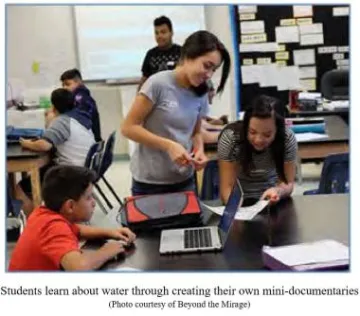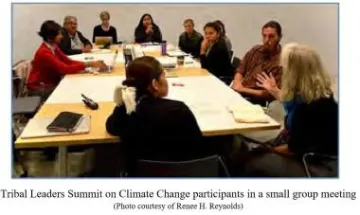When citizens, policymakers, and business leaders need to determine how they want to live, where they want to spend their money, or what policies they want to challenge or propose, they often turn to academic research. At the University of Arizona, some of the most compelling community-connected research is supported by the Technology and Research Initiative Fund, TRIF.
INFORMING THE PUBLIC: WHEN IT COMES to WATER, EVERYBODY IS A STAKEHOLDER
On April 22, 2016, more than 500 students between 6th and 8th grades came from Pendergast, Peoria, Phoenix, Dysart, and Washington school districts to share and judge each other's mini-documentaries about water. The students, who spent the year studying complex and interconnected water systems through the Arizona Project WET program, had the opportunity to showcase their knowledge using segments or "stacks" from Beyond the Mirage—an innovate and cutting-edge documentary and website.

Long before students developed these “stacks”, leaders in Arizona determined a need for greater water consciousness across the state. Megan Brownell, chief brand and impact officer for the Arizona's Community Foundation, convened state leaders to determine what needed to be addressed. "We heard from the community that water was, by far, the most pressing issue for Arizona and that we first needed to educate the public and raise the consciousness of Arizonans about our water present and our water future: Brownell said.
The Arizona Community Foundation partnered with Republic Media and ASU'S Morrison Institute for Public Policy to create a philanthropic prize competition, The New Arizona Prize, which would fund a creative approach to educating the public about water. They called the endeavor the Water Consciousness Challenge.
A team from UA, including film director Cody Sheehy, developed an innovative plan for creating both a feature-length documentary and an interactive website that would allow viewers to create their own mini-documentaries from more than 250 clips—the "stacks" students used for their mini-documentaries. Dr. Sharon B. Megdal, director of the UA Water Resources Research Center, had the foresight to support this unique project and leveraged TRIF funds to springboard the efforts.
"One important thing to remember here is that TRIF funding comes from taxpayers and water users," Megdal said. "And every water user in Arizona is a stakeholder."
Beyond the Mirage was one of 22 teams that competed for The New Arizona Prize: Water Consciousness Challenge purse of $100,000. On April 1, after a 10-minute live pitch to the judging panel and in front of an audience of more than 300, Beyond the Mirage was selected as the winner from among five finalists.
"The online clip organizer was innovative, interactive, and engaging; it had the capacity to be shared across networks and be something both fun and educational to use," said Brownell "Beyond the Mirage offered a comprehensive approach to educating the public about an important issue in new, forward-thinking ways. It's stark, it's visual. It's incredibly compelling." The documentary received glowing reviews from teachers, policy-makers, and community members alike.
Kerry Schwartz, director of the UA'S Project WET and organizer of the mini-documentary competition for middle-school students, said "kids were extremely engaged in the Beyond the Mirage experience and they surprised their teachers (who'd been teaching them about water in Arizona all year) with the sophistication of their language and understanding of ideas they'd learned about on the Beyond the Mirage website."
CONNECTING THE DOTS: ENHANCING TRIBAL ACCESS TO EXPERTISE AND FUNDING RESOURCES
Chad Marchand is the project coordinator for the LIA's Native Nations Climate Adaptation Program (NNCAP) and the Center for Climate Adaptation Science and Solutions which receives substantial funding from TRIF. Marchand, a member of the Colville Confederated Tribes. is tasked with coordinating the efforts of climate and environmental researchers faculty, and students to support Native Nations-related adaptation research. Given that only to of 567 tribes in the United States have a climate plan, that's a daunting task.
For Marchand, working with the Southwestern tri5es and empowering Native students at the IJA to work on issues related to climate change are central priorities. Schuyler Chew, a Ph.D. student working for Marchand, is Mohawk Wolf Clan from Six Nations of the Grand River. He grew up on the Tuscarora Nation just outside Niagara Falls in New York, and focused his master's degree work on wetland restoration within his home community.
"Our goal is to put the tribes in the best position to be able to make informed decisions about adaptation." Chew said, "We're not telling them what to adopt, but just trying to give them the most robust scientific information available so they can make the best decisions to suit their needs,"
Another goal of NNCAP is to ensure that tribes are aware of and have access to funds being made available to them. Funds. for example like the nearly $12 million that the Bureau of Indian Affairs distributed for climate
change adaptation planning in 2015.
"Being a land-grant institution, the UA has an obligation to work with the tribes in Arizona and serve them to the best capacity, and many of those needs are tied to climate change,"
Chew said. "NNCAP is connecting tribes with researchers and scientists to meet their needs in a way that respects their sovereignty and promotes engagements with researchers."
LINKING TO COMMUNITY: MAKING CLIMATE SCIENCE RESPONSIVE TO PUBLIC NEEDS

Dr. Daniel Ferguson is the director of the Climate Assessment for the Southwest (CLIMAS) a TRIF-funded program at UA dedicated to improving the region's ability to respond effectively to climatic events and changes. CLIMAS engages the public on what questions they want answered by the scientific community and ensures that research is translated in a way that makes sense to a broad audience.
Important Information, Delivered with Style:
CLIMAS's Southwest Climate Podcast is the number-one climate podcast in the region, And while the cohost Dr. Michael Crimmins jokes about that being because it's the only one. the niche it fills is indeed very real. The format of the podcast is a refreshing break for policymakers like Kathy Chavez water policy manager at the Pima County Regional Wastewater Reclamation Department. "The discussion with Mike and (co-host) Zack Guido is real casual. It's refreshing to have something other than print media," said Chavez.
"Land managers and agriculturalists are all weather nerds by nature of their jobs: Crimmins said. "l didn't think ranchers would have time or patience to listen but they do. For folks who are trying to keep an eye on drought, the podcast offers relevant and timely information."
Science Informing Community Decisions:
In 2009. the Hopi Department of Natural Resources requested CLIMAS support for drought monitoring research. The tribe wanted to better understand drought patterns so they could make scientifically-backed resource management decisions. Ferguson and his team responded by helping the tribe to find creative ways to monitor Hopi lands for drought without access to a lot of climate data. One result was the tribally-produced quarterly Drought Status Report.
The Hopi Tribe was concerned about whether to allow cattle grazing on a certain portion of land. upon reviewing the September 2014 Drought Status Report, the Tribe decided to request the removal of livestock in order to protect their natural resources, and in the formal decision the Tribe cited the report, Ferguson added. "It was a decision based on research and science, and it was information they wouldn't otherwise be getting. "

